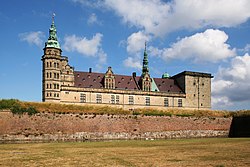Anthonis van Obbergen (Antonius, Anthonis, Anthony, Antonie, Anton - Obberghen, Oberberg, Opbergen) (1543 in Mechelen – 1611 in Danzig (Gdańsk)) was a Flemish architect and fortifications engineer. After studying masonry in Mechelen and completing a tour to study fortification work in Germany, he initially gained experience working on the fortifications of Antwerp (1567–71).[1] He later worked in Denmark and Poland where he designed fortifications as well as civilian homes.[2][3]

Achievements in Denmark
editIn Denmark, he is remembered for his exceptional work on the Royal Palace of Kronborg in Helsingør (1577–86) which he completed after another Flemish architect, Hans van Paeschen, resigned from the project in 1577.[2][4] Inspired by the Flemish Renaissance style of Antwerp developed by Cornelis Floris, the building quickly gained international fame, both as an architecturally imposing building and as the largest castle in northern Europe. Although most of it was destroyed by fire in 1629, Christian IV had it rebuilt in accordance with van Obbergen's design. Today's castle has not changed substantially since that time.[5]
In 1585, under Frederik II, van Obbergen replaced the tower of the Kullen Lighthouse in the Öresund. The area is now part of Sweden.[6]
Achievements in Poland
editIn 1586, van Obbergen moved to Danzig where he brought a Flemish flavour to the city's architecture.[3] In particular, he designed together with Jan Strakowski and Abraham van den Blocke[7] the Old Arsenal, one of the great buildings in the Flemish Renaissance style (1601–1609) as well as the Old City Hall (1587–1595) which displays the classic features of high quality Mannerist Flemish architecture.[8]
Other achievements include a number of fine houses in Danzig which he designed together with Jan Strakowski as well as work on the city's fortifications.[9]
Van Obbergen also designed the Old Town Hall in Toruń, Poland, which was completed in 1603.[10][11]
See also
editReferences
edit- ^ Anthonis van Obbergen. From Kunstindeks Danmark. In Danish. Retrieved 2 December 2009.
- ^ a b Antonius van Opbergen from Encyclopedia.com. Retrieved 2 December 2009.
- ^ a b Die Architekten und Maler aus Danzigs großer Zeit. Archived 22 June 2009 at the Wayback Machine In German. Retrieved 2 December 2009.
- ^ The Renaissance Castle of Kronborg. From Palaces and Properties Agency Archived 1 March 2012 at the Wayback Machine. Retrieved 1 December 2009.
- ^ Kronborg Slot and the Maritime Museum. From The Rough Guide to Denmark.. Retrieved 2 December 2009.
- ^ Lighthouses in Öresund. Archived 3 September 2011 at the Wayback Machine Retrieved 2 December 2009.
- ^ (in English) Lech Krzyżanowski; Michał Wożniak; Marek Źak; Wacław Górski (1995). Beautiful historic Gdańsk. Excalibur. p. 769. ISBN 9788390343150.
- ^ Historical monuments, Gdansk. Archived 24 February 2012 at the Wayback Machine. Retrieved 2 December 2009.
- ^ Obergen Antoni. From Kunstlexikon Arts4x.com. Archived 7 July 2011 at the Wayback Machine In German. Retrieved 2 December 2009.
- ^ Explore24 from PoloniaToday Archived 27 February 2009 at the Wayback Machine. Retrieved 2 December 2009.
- ^ Koto Naukowe Historyków. Archived 28 March 2009 at the Wayback Machine In Polish, retrieved 2 December 2009.